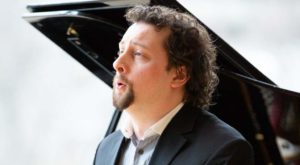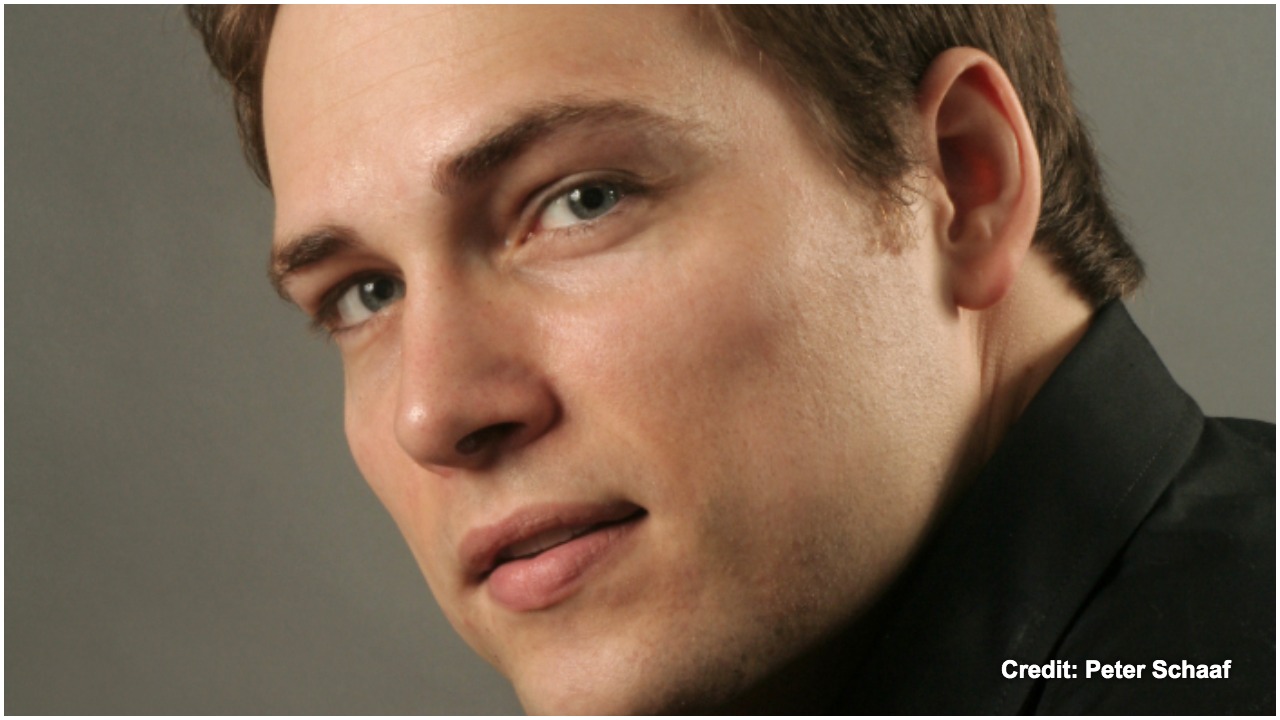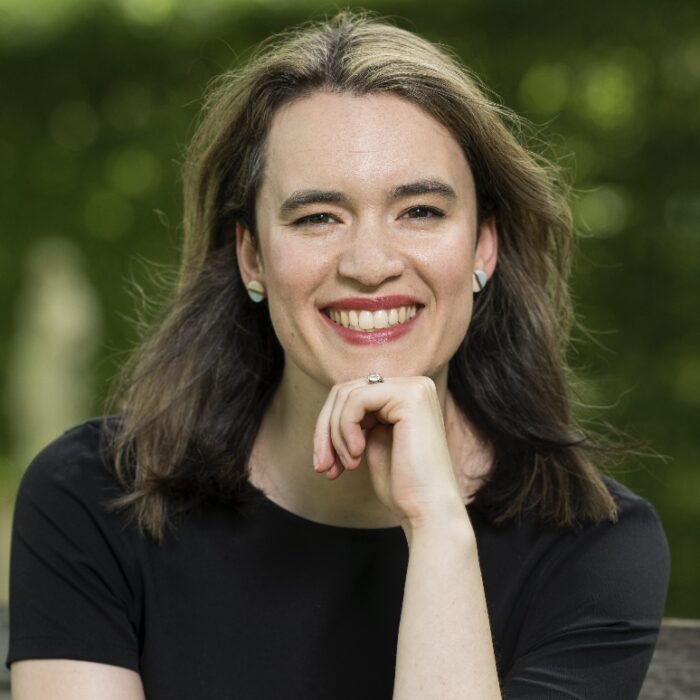
Q & A: Bass-Baritone Joel Allison On Opera Culture In Canada & How A ‘Tosca’ Radio Broadcast Changed His Life
By David Salazar(Credit: Ian McIntosh Photography)
Joel Allison made his debut at the age of 12 as the treble soloist in Howard Shore’s “Lord of the Rings” Symphony. Today this Canadian singer of the new generation has been praised for the “beautiful, rich, ringing tone” of his bass-baritone voice.
Allison is working as a recitalist, soloing with all of the prominent Canadian orchestras and as an opera singer, with a repertoire of such roles as “Basilio” in Il Barbiere di Siviglia; “Scahunard” in La Bohème; “Leporello” in Don Giovanni and “Zaretsky” in Eugene Onegin. He was praised for his operatic repertoire performance as having “a beautiful instrument precise in its intonation and articulation, serene and aristocratic.” OperaWire contributor and Musicologist Ona Jarmalavičiūtė spoke with Allison about his career path, daily rituals and the situation of opera in his home country Canada.
OperaWire: I wanted to start by asking you about your Canadian upbringing.
Joel Allison: I was really lucky, I grew up near Ottawa, the capital city; they have many wonderful teachers and a really wonderful history of teaching music very well. I started piano lessons when I was seven and when I was 10-years-old I joined the Men and Boy’s choir of Christ Church Cathedral Ottawa. That very traditional British choral training provided me with the foundation of my singing technique and gave me great sight-reading skills
I also had phenomenal private teachers as well who really developed my technique. I also studied the violin and wanted to become a Violinist, not a singer. I was assistant concertmaster in the Ottawa Youth Orchestra and in the end minored in violin during my undergraduate degree at the University of Ottawa.
Ottawa is kind of famous for developing young musicians. The list of famous singers that are working now in Europe and around the world is impressive and there are a lot of instrumentalists that work around North America in various orchestras etc. So there is a strong music community in Ottawa. A lot of people leave Ottawa because there is not as much work there. There are two orchestras and some chamber music going on, but only so many jobs.
Another wonderful thing is that Ottawa has now two summer chamber music festivals and it really shaped my knowledge of music. When I was a kid there was only the Ottawa Chamber Music Festival, I would go in the summer to spend the entire days at the festival. I bought a pass and I would go to four or five concerts a day. There was a breakfast/morning performance, the noon performance, the afternoon performance, and evening performance and sometimes there would be a late night performance at 11 pm. I just was able to hear so much music and learn by watching the artists. Those are my training influences from Ottawa.
OW: What is the opera scene like in Canada?
JA: With regards to the music scene in Canada, it is very diverse I would say. In major city centers – Toronto, Montreal, Ottawa, and Vancouver – there is a lot of things going on at different levels from youth and community productions and concerts to the professional orchestras.
Ottawa has a phenomenal choir community. There are about 100 choirs at various different levels throughout the Ottawa Valley. They have phenomenal choirs and there is every type of choir from youth choirs and community choirs to professional choirs and everything in between. It is quite astounding.
In Toronto, it is a strong community and a lot of events that are going on there. This is the city where I am based now. The opera company does six fully staged opera productions a year, generally with seven or eight performances per production. I know that in Europe that seems like not that many productions, but that is all Toronto really can sustain in a year for the big opera house.
So that is the big company in Toronto and we have also a couple of smaller companies that do various different form of opera. We have Opera Atelier which performs primarily baroque and french opera with ballet, but only do two productions per year.
There is another company called “Against the Grain” and they do a lot of contemporary adaptations of classical operas and then also some new modern operas and makes commissions for contemporary composers.
Also, there is a very special scene in Toronto that we call indie operas – the independent opera companies. It’s small and a really phenomenal way for the young singers that are recently out of school to build up experience and it gives also a lot for young directors.
In Montreal, they also have a big opera company and they do seven-six productions a year as well. Now they are starting to make some shorter chamber operas in other venues and this is a part of their yearly program as well. This gives for the younger musicians other opportunities to perform. In Vancouver, their opera company does three or four productions a year.
Vancouver has a couple of really good early music ensembles, some Also on the west coast you have the city of Victoria which has a symphony orchestra and an opera company called Pacific Opera Victoria.
In the middle of Canada, the prairies, you have Saskatoon, Regina, Edmonton, Calgary, and Winnipeg as the major cities for the prairies. They all have symphony orchestras and some also have opera companies. Edmonton and Calgary each do three opera productions a year, Saskatoon does one opera production, and Winnipeg has two opera companies. Manitoba Opera does two productions a season, and the Manitoba Underground Opera company does around four smaller productions every year.
OW: When you go to Europe or Austria, do you see any differences between musical cultures?
JA: I would say that the biggest difference is that here the traditional classical music is a part of everyday life – especially in Salzburg. Everyone here knows and appreciates music. For example, I and my colleagues had dinner here and people were noticing that we were singers in the Salzburg Festspiele.
If you are anywhere in Toronto, the odds of that happening are close to none. So that is a big difference. Canada has a very big sports culture, so more funding from the government goes towards sports over music and the arts in Canada.
It is harder for Canadian arts organizations to get people to come to live performances in a Netflix age. The prices for tickets are reasonable and affordable though. Especially for young people – all the orchestras and opera companies for example have done a great job with student pricing and under thirty pricing, etc.
But it is expensive to live in those large cities. So a lot of people spend a lot of their income just on day to day expenses. They don’t have that much money to go and see a live performance.
OW: Your voice is your main tool in work. Do you have any routines to nourish it?
JA: Generally, I don’t have that many routines. Staying hydrated is a big thing for me, on my flight over to Salzburg, I used a Humidiflyer mask which helps prevent one from getting dehydrated and also helps prevent breathing in the germ filled air in the airplane. So when I first got to Salzburg, all I did was drink lots of water to stay hydrated. I get a fair amount of allergies in the summer no matter where I am and so I tried to fix it as naturally as I can, I don’t like using medications. I use a Navage Nasal care machine to clean my sinuses and to prevent post-nasal drip. Post-nasal drip can really cause a lot of vocal problems for me.
To acclimatize to a new environment I always look for local organic natural honey that helps me to adjust. I found one in the market here in Salzburg. It was very nice and it helped my body to be more acclimatized and minimized my allergies. Being here for two months, your body needs to adjust to the environment quickly so that you don’t get sick or lose too much sleep.
When I am healthy, I try to stay hydrated and I do my best to get eight hours of sleep or more. I know, it is not always possible, but that is really the big thing for me, honestly.
OW: What does your repertory look like?
JA: My favorite roles to sing, right now are Figaro from the “Le Nozze di Figaro,” Leporello from the “Don Giovanni.” And being a bass-baritone, it gives you a better chance to play the bad guys as well, which I have a lot of fun with. I haven’t done much from that repertoire, but I want to do more.
I really want to perform the role of Nick Shadow from “The Rake’s Progress” by I. Stravinsky and then I would love to do the four villains from the “Les Contes d’Hoffmann.” But for now I am trying to perform the roles from Mozart and the Handel operas. In my training, I did a lot of early – Baroque and Renaissance music. That is something I feel like not every singer gets a chance to do when they are training. I really love singing that music and I hope I continue to perform early music throughout my career.
OW: What is the work process to find and to build the character in an opera?
JA: It really depends on the character. Whether it is a new or a classic opera, because in classic operas the character has been done a million times over so then you are figuring out what did Puccini wrote and how am I going to interpret that. When it is a world premiere I have a bit more freedom, I come in knowing everything about what it means and what was written. I have an idea and I’ll offer that and talk about it with the director and composer.
Then I really let the director manage the rest of it. Everything really depends on the production. For some directors, it might be their first time doing this opera and it might be their twentieth time. This might be a production that they’ve built 10 years ago and have been touring the world with it. In that situation, the director knows that piece so intimately and I just make sure to know my lines and how my character works in the story he will tell me the rest.
OW: How did you envision the profession of an opera singer when you were younger and what were the expectations?
JA: When I was young, I really hated opera. I even told my family – I will never sing opera. I loved the choral repertoire and I loved oratorio and didn’t really want to do anything else singing wise. But after my orchestra rehearsals on Saturday mornings, I would always go back to my parents car and go home. And in the car, they would always be playing the classical music station CBC (Canadian Broadcasting Corporation) on the radio and every Saturday afternoon the CBC would have the Met broadcast.
I must have been about 14 when “Tosca” was playing one day and as we came in a car, it was “Te Deum.” I didn’t know what the opera was, but I heard the chorus and was blown away. It was a very very good recording.
That same year my orchestra went to Budapest and Vienna and we saw “Turandot” at the Wien VolksOper and that got me more into opera.
When I was 15, I was singing now in the bass section of the St. Matthew’s Men and Boy’s choir. We did a big anniversary concert and they had a bunch of famous singers come to perform with us. One of them was Gerald Finley. When I heard him sing, I thought to myself: “So is this what an opera singer suppose to sound like.”
When I was 16, I applied to the Ontario youth choir and I did their summer program with them. After the summer program, the vice president of the choir, who was also the opera director at the University of Ottawa, invited me to be in chorus for her production of “Carmen,” but a couple weeks into rehearsals two of her baritones dropped out of production and I got to then sing the role of Dancairo in “Carmen.” So then the professor started giving me the voice lessons. That was a lot of fun. I started working on opera singing.
OW: You also work with ensembles and perform as a concerting soloist. How do you see and evaluate this part of your career?
JA: I do a lot of concert repertoire and that comes from my time in Ottawa because when I was younger I sang in a lot of choirs and had my first solo performances stepping out from the choir to do little solos. I really enjoy that repertoire. The thing about the opera is, that you do one show for two months and that is really the only thing that you are working on during that time.
I love the concert repertoire because it gives me more time, more freedom and I just get to perform more. Also, you are not gone as long – it’s never really more than a week – so that’s nice. At most, you have four performances, but generally two or three. You do three days of rehearsals and couple performances and you are back home with your family.
OW: Do you ever think about your impact on the listener?
JA: My favorite thing to be told after a performance, is that they could understand every word and they could understand the atmosphere I was creating with it or the story I was telling. For me, that means I did my job well. It feels great when the audience loves your voice, but generally, people are drawn more to the story and they might realize the beauty of the certain line or something about the character.
OW: Is this your first time at the Salzburger Festspiele festival?
JA: I was here when I was 19. I performed in “Zauberflöte” and I spent a month in this city. Now it is nice to feel like I am coming back to a familiar place. But it does feel completely different this time being here and singing in the Salzburger Festspiele.
OW: What was your impression from the first time?
JA: The first time I was here, I was like “oh my goodness.” Everything was so exciting. Then I was musically or operatically a child. And now I feel like I a teenager or a young adult – I am a little less starstruck, I have already seen all the big halls and everything. It is a really really beautiful city. Rehearsals are at a really high level. You are constantly around so many artist working really professionally. There is so much joy and desire to do the best you can in this an environment. You really offer to the audience everything that you possibly can. That is really exciting to work at that level, where opera means so much to everyone – everything is heightened.
OW: What are you excited about this year?
JA: Well it is always fun to do a brand new piece and to work with a composer and Adrian Kelly. With this piece I feel like the composer sees himself in the role I am singing. That’s a lot of pressure to bring a performance when you realize that the role you are singing is a reflection of the person who wrote it. To really try to do that to the best of your ability, that’s really exciting.
After the festival, I am going back to Canada and doing my final year in the Ensemble Studio at the Canadian Opera Company. There are a lot of small roles and concerts this year, I am doing a couple more debuts, more auditions. I just got an agent in Canada. She is working really hard for me to get more work once I am done at the Canadian Opera Company. I have various different parts of my family living throughout Canada and I don’t get to see them very often. So it would be great to be able to go do concerts in different parts of Canada and then to be able to meet my family.
The ultimate goal for me is to have an international career. I would love to sing around the world, I love traveling. Finally, I would love to be able take my wife with on concert tours and just be tourists for a few days together.


